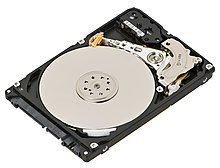External volumes

Internals of a 2.5-inch SATA hard disk drive
|
|
| Date invented | 24 December 1954 |
|---|---|
| Invented by | IBM team led by Rey Johnson |
A hard disk drive (HDD), hard disk, hard drive or fixed disk is a data storage device that uses magnetic storage to store and retrieve digital information using one or more rigid rapidly rotating disks (platters) coated with magnetic material. The platters are paired with magnetic heads, usually arranged on a moving actuator arm, which read and write data to the platter surfaces. Data is accessed in a random-access manner, meaning that individual blocks of data can be stored or retrieved in any order and not only sequentially. HDDs are a type of non-volatile storage, retaining stored data even when powered off.
Introduced by IBM in 1956, HDDs became the dominant secondary storage device for general-purpose computers by the early 1960s. Continuously improved, HDDs have maintained this position into the modern era of servers and personal computers. More than 200 companies have produced HDDs historically, though after extensive industry consolidation most current units are manufactured by Seagate, Toshiba, and Western Digital. HDD unit shipments and sales revenues are declining, though production (exabytes per year) is growing. Flash memory has a growing share of the market for secondary storage, in the form of solid-state drives (SSDs). SSDs have higher data-transfer rates, higher areal storage density, better reliability, and much lower latency and access times. Though SSDs have higher cost per bit, they are replacing HDDs where speed, power consumption, small size, and durability are important.
...
Wikipedia
